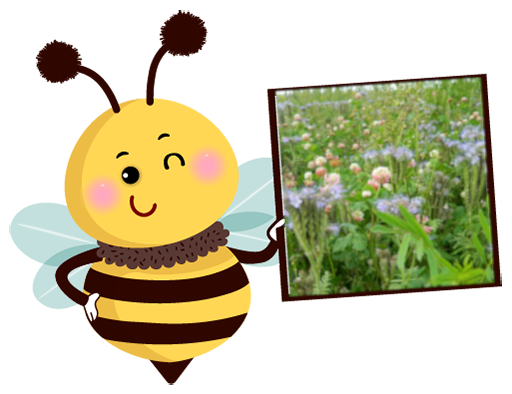Bee Squared
Planting wildflowers

In spring 2023 we aim to distribute 1000 packs of wildflower seeds to Haddenham residents. We particularly want to offer these as welcome packs to new residents and those people in new build housing where gardens are not yet established.
A number of communities in Buckinghamshire are doing the same thing. Together we can help to reverse the apocalyptic decline in the bee population.
We want as many residents as possible to clear a 1 square metre of garden and lightly dig over, scatter seed and cover with a fine layer of soil. Firm down and water… keeping the area moist in dry weather.
Bees are important.
They are important in maintaining the planet. They pollinate much of the food that is grown across the world, without them we could not produce enough food. They also pollinate the trees and flowers that provide habitats for lots of wildlife that keep our planet healthy. Around 90% of bees in the UK are solitary bees. They need a lot of energy to keep going and don’t have a hive to return to. In order to keep going they need to ‘refuel’ on flowers and plants every few metres.
The Food and Agricultural Organisation of the United Nations, tell us that around 80% of all flowering plants rely on pollination by bees and other insects. Vegetables, fruits and crops rely on this to be fertilised and to grow. Estimates suggest it would cost UK farmers an incredible £1.8bn a year to manually pollinate their crops.
There are lots of reasons why bees are in trouble.
Habitat loss
An increase in urban developments and invasive farming methods means that many of the areas bees once called home no longer exist. In the wild, several species of bee nest in hollow trees, so as more trees are destroyed, so are the bees’ homes. Wildflower meadows and other areas abundant in flowering plants are also in serious decline, reducing an important food resource for bees.
Climate change
Climate change and the extreme weather it can cause disrupts bee nesting behaviour and alters the normal seasonal timings, so flowers may bloom earlier or later than expected. Planting more trees is helping to mitigate some of the effects of climate change, but it’s still a serious issue that could prove deadly for many of our bees.
Wildflowers in decline
Native wildflowers are the species that are naturally found in the UK, rather than introduced from elsewhere. Their names reveal the ancient culture of the UK – cowslip, selfheal, ragged robin, devil’s-bit and scabious to name a few.
But our native wildflowers are in decline. Since the 1930s, we’ve lost 97 per cent of UK wildflower meadows, through changes in farming methods and the development of land for property.
The wildflower–pollinator relationship is crucial. When one side benefits, so does the other – and when one side struggles it can have massive repercussions for the entire ecosystem. With fewer wildflowers growing in isolated patches, our pollinators are struggling, often left stranded without nearby flowers to move on to. And fewer pollinators means fewer flowering plants.